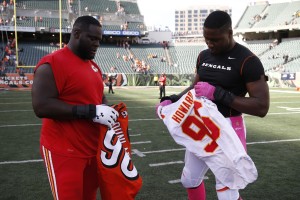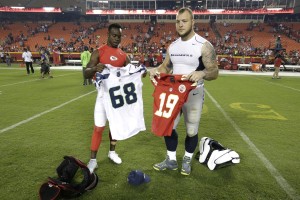KANSAS CITY, Mo. – Chiefs kicker Cairo Santos has a firm grasp of soccer traditions, a sport he grew up playing in his native Brazil.

Oct. 4, 2015; Cincinnati; Former Florida Gators teammates, Chiefs defensive lineman Jaye Howard (left) and Bengals defensive end Carlos Dunlap (right), exchange jerseys after the game at Paul Brown Stadium. (AP Photo/Gary Landers)
And one of the oldest customs Santos knows well surrounds the postgame exchange of jerseys.
“You see a lot of the young players swapping jerseys with older veterans just because they grew up watching them and respect the kind of player they are,” Santos said. “So, they want to have that memorabilia, ‘Hey, I got to play against this player.’”
Santos is pleasantly surprised the soccer tradition now has firm roots in the NFL, where the exchanges aren’t limited to the holiday seasonal spirit of giving and receiving.
The act of swapping jerseys occurs throughout the NFL preseason and regular season, and the rising trend isn’t likely to disappear anytime soon.
“It grew even more in the couple of years since I’ve been following the NFL,” Santos said. “It’s a cool tradition, it’s awesome.”
The custom won’t be spotted on television, as viewers deal with cameras panning away from the field to studios or cutting to other broadcast games.
Fans lingering behind in stadiums, however, shouldn’t have trouble looking beyond the handshakes to quickly identify a collection of players participating in an exchange.
Mutual respect has a role, of course, but a majority of NFL players incorporate a method to determine the initiation of the jersey swap.
And the practice isn’t restricted to specific position groups.
“I exchanged jerseys last year with a lineman, (New York Jets guard/tackle) Breno Giacomini,” Santos said. “He was born in Brazil, has American parents, speaks Portuguese, we chatted a little bit.”
Running back Knile Davis’ approach to collecting jerseys surrounds close personal ties.
“It’s kind of just guys that you know,” Davis said. “For me, guys that I know I played in college with or guys that are from the same place I’m from.”
Davis, who played collegiately at Arkansas, said he exchanged jerseys over the past three years with former Razorbacks, including Minnesota Vikings wide receiver Jarius Wright, San Diego Chargers wide receiver Javontee Herndon and Buffalo Bills tight end Chris Gragg.
“All these guys, I have a good relationship with off the field,” Davis said. “So, get their jerseys and put it up at the house and have something to remember. Frame it, so when they come over to the house they see it.”
Defensive end Jaye Howard said he seeks out college teammates and extends the exchange to players he met during the predraft training process or at the NFL Scouting Combine.
Howard has a vision of what he will eventually do with his collection.
“We play those guys,” Howard said. “I just want to get them because my dream when I’m done playing, I want to have a wall full of jerseys and have them framed.”
Second-year offensive lineman Zach Fulton only has one jersey, which he obtained from Miami Dolphins offensive tackle Ja’Wuan James in Week 3 of the 2014 season.
And the swap carried special meaning to Fulton, who was James’ roommate at Tennessee.
“It’s kind of something that says you made it and so did your friend,” Fulton said with a smile. “Mine is in my basement. It’s framed, of course.”
Center Mitch Morse is among players yet to exchange jerseys.
The rookie out of Missouri indicated he isn’t comfortable participating in the trend as a rookie, but he wouldn’t mind eventually partaking in a swap.
“I feel like most guys I see do jersey swaps are not rookies,” Morse said. “I don’t know what it takes to get another jersey or if it costs me money. I don’t really want to get in trouble, but I eventually would love to. I don’t feel like I’m in the right place to do that.”
When he finally reaches the comfort zone, Morse already knows who he will look for after a game.

Aug. 21, 2015; Kansas City, MO; Former Missouri Tigers, Chiefs wide receiver Jeremy Maclin (left) and Seattle Seahawks tackle Justin Britt (right), exchange jerseys after a preseason game at Arrowhead Stadium. (AP Photo/Charlie Riedel)
“I think I’ll probably just go fellow Mizzou players in the NFL,” Morse said. “I’m sure I’ll build relationships over time and grab some other ones, but right now just fellow Mizzou players.”
While some players enjoy the postgame trend, not every player in the league embraces it.
Wide receiver Jason Avant, a 10th-year pro, was raised in Chicago and recalled a heated NBA rivalry to form his mentality.
“I grew up when the Detroit Pistons didn’t like the Chicago Bulls and you followed it a little bit,” Avant said. “You didn’t take pictures or exchanged jerseys after the game. It’s not my cup of tea.”
There is also the outcome of a game to consider.
“If I lost a game, I’m not going out there swapping jerseys,” Avant said. “That’s just my opinion, so that’s just it. I wish there was more grittiness to football.”
Outside of personal feelings, some NFL teams attempt to deter players from participating in jersey exchanges by incorporating fines.
Defensive lineman Nick Williams, who entered the league in 2013 as a seventh-round pick with the Pittsburgh Steelers, said his former team fines its players $1,500 if they give away their uniform top after a game.
The Chiefs hosted the Steelers in Week 7 and Williams got creative with his ex-teammates.
“I just got them to send me their jersey after the game,” Williams said. “I got (safety) Shamarko Thomas’ jersey, (defensive tackle) Steve McLendon’s jersey is coming, (offensive lineman) Chris Hubbard is supposed to be sending me his jersey.”
The Chiefs don’t fine their players for swapping jersey tops with opponents, according to a team spokesman. Instead, a Kansas City player ends up paying for any jersey he gives away.
Still, Howard points out attempting a transaction with a player on a team that hands down a monetary penalty presents a challenge.
“It gets harder to swap,” Howard said. “Some teams have a smaller fee; some teams have a big one. When it gets up to the $1,000 range, it’s pretty much you don’t even want to swap them. But that’s understandable because I don’t want them to take that out of my pocket either.”
Howard’s affinity with obtaining jerseys goes beyond opponents, as he also seeks out his teammates along the defensive line at the end of the season with his family in mind.
“One day I’ll be able to show my sons, look at these guys I know,” he said.
It is that sense of nostalgia that drives some players to take an extra step outside of a handshake and hug at the end of a game.
Santos said he hopes to eventually have a room full of helmets and framed jerseys dating back to his high school days as a way to stay connected to what he does now as an NFL player.
“One day it’s going to be over for all of us,” Santos said. “It’s always good to have those kinds of memorabilia to bring back the good memories.”
———-
Herbie Teope is the lead Chiefs beat writer for ChiefsDigest.com and The Topeka Capital-Journal. Use the contact page to reach him or find him on Twitter: @HerbieTeope.
———-

